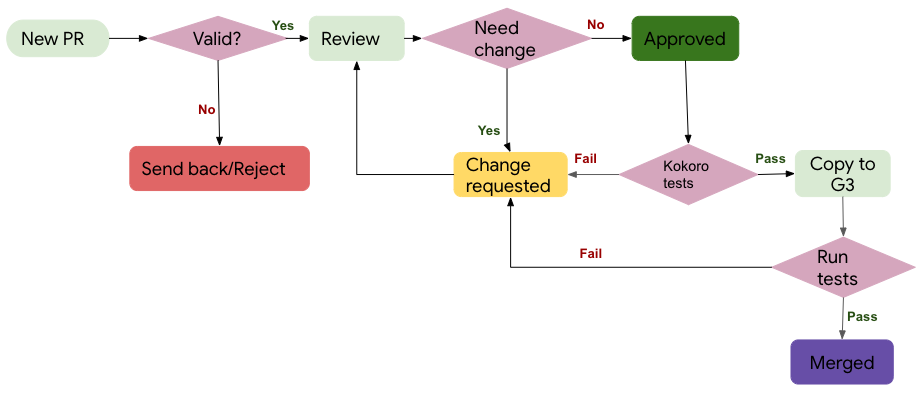- Sort Score
- Result 10 results
- Languages All
Results 51 - 60 of 300 for typical (0.05 sec)
-
CONTRIBUTING.md
## How to become a contributor and submit your own code  ### Typical Pull Request Workflow - **1. New PR** - As a contributor, you submit a New PR on GitHub. - We inspect every incoming PR and add certain labels to the PR such as `size:`,
Registered: Tue Dec 30 12:39:10 UTC 2025 - Last Modified: Sat Jan 11 04:47:59 UTC 2025 - 15.9K bytes - Viewed (0) -
android/guava-tests/test/com/google/common/util/concurrent/GeneratedMonitorTest.java
validateMethod(method); addTests(suite, method); } } assertEquals(980, suite.testCount()); return suite; } /** A typical timeout value we'll use in the tests. */ private static final long SMALL_TIMEOUT_MILLIS = 10; /** How long to wait when determining that a thread is blocked if we expect it to be blocked. */
Registered: Fri Dec 26 12:43:10 UTC 2025 - Last Modified: Thu Dec 11 21:00:51 UTC 2025 - 27.1K bytes - Viewed (0) -
guava/src/com/google/common/collect/Iterables.java
* iterable}. The iterator's {@code hasNext()} method returns {@code true} until {@code iterable} * is empty. * * <p><b>Warning:</b> Typical uses of the resulting iterator may produce an infinite loop. You * should use an explicit {@code break} or be certain that you will eventually remove all the * elements. *
Registered: Fri Dec 26 12:43:10 UTC 2025 - Last Modified: Mon Nov 17 22:50:48 UTC 2025 - 43.6K bytes - Viewed (0) -
guava/src/com/google/common/util/concurrent/Striped.java
* for a pair of them to match). Please consider carefully the implications of the number of * stripes, the intended concurrency level, and the typical number of keys used in a {@code * bulkGet(keys)} operation. See <a href="http://www.mathpages.com/home/kmath199.htm">Balls in * Bins model</a> for mathematical formulas that can be used to estimate the probability ofRegistered: Fri Dec 26 12:43:10 UTC 2025 - Last Modified: Tue Sep 16 22:01:32 UTC 2025 - 20.6K bytes - Viewed (0) -
guava/src/com/google/common/collect/Iterators.java
* iterable}. The iterator's {@code hasNext()} method returns {@code true} until {@code iterable} * is empty. * * <p><b>Warning:</b> Typical uses of the resulting iterator may produce an infinite loop. You * should use an explicit {@code break} or be certain that you will eventually remove all the * elements. */
Registered: Fri Dec 26 12:43:10 UTC 2025 - Last Modified: Tue Sep 16 12:42:11 UTC 2025 - 51.4K bytes - Viewed (0) -
okhttp/src/commonJvmAndroid/kotlin/okhttp3/internal/cache/DiskLruCache.kt
field = value if (initialized) { cleanupQueue.schedule(cleanupTask) // Trim the existing store if necessary. } } /* * This cache uses a journal file named "journal". A typical journal file looks like this: * * libcore.io.DiskLruCache * 1 * 100 * 2 * * CLEAN 3400330d1dfc7f3f7f4b8d4d803dfcf6 832 21054Registered: Fri Dec 26 11:42:13 UTC 2025 - Last Modified: Wed May 28 23:28:25 UTC 2025 - 34.7K bytes - Viewed (0) -
okhttp/src/commonJvmAndroid/kotlin/okhttp3/internal/http2/Http2Connection.kt
* A socket connection to a remote peer. A connection hosts streams which can send and receive * data. * * Many methods in this API are **synchronous:** the call is completed before the method returns. * This is typical for Java but atypical for HTTP/2. This is motivated by exception transparency: * an [IOException] that was triggered by a certain caller can be caught and handled by that caller. */ @Suppress("NAME_SHADOWING")
Registered: Fri Dec 26 11:42:13 UTC 2025 - Last Modified: Thu Jul 31 04:18:40 UTC 2025 - 31.8K bytes - Viewed (0) -
guava/src/com/google/common/collect/FluentIterable.java
* fluent iterable. The iterator's {@code hasNext()} method returns {@code true} until this fluent * iterable is empty. * * <p><b>Warning:</b> Typical uses of the resulting iterator may produce an infinite loop. You * should use an explicit {@code break} or be certain that you will eventually remove all the * elements. *
Registered: Fri Dec 26 12:43:10 UTC 2025 - Last Modified: Mon Sep 22 18:35:44 UTC 2025 - 34.7K bytes - Viewed (0) -
guava/src/com/google/common/base/Predicates.java
* * <p>If you want to filter an {@code Iterable} to narrow its type, consider using {@link * com.google.common.collect.Iterables#filter(Iterable, Class)} in preference. * * <p><b>Warning:</b> contrary to the typical assumptions about predicates (as documented at * {@link Predicate#apply}), the returned predicate may not be <i>consistent with equals</i>. ForRegistered: Fri Dec 26 12:43:10 UTC 2025 - Last Modified: Thu Aug 07 16:05:33 UTC 2025 - 26.6K bytes - Viewed (0) -
MIGRATION.md
#### Configuration Import Fess can directly import GSA XML configuration files, automatically converting them to native Fess configurations. **Step 1: Export GSA Configuration** Export your GSA configuration as XML. A typical GSA configuration includes: - Collections with URL patterns - Start URLs and crawl rules - User agent settings - Good/bad URL patterns **Step 2: Import via Fess Admin UI**
Registered: Sat Dec 20 09:19:18 UTC 2025 - Last Modified: Thu Nov 06 12:40:11 UTC 2025 - 23.2K bytes - Viewed (0)